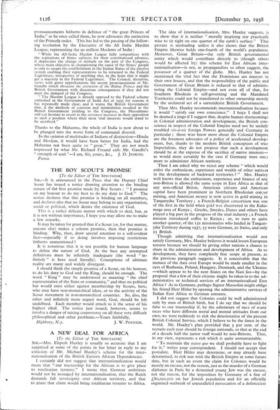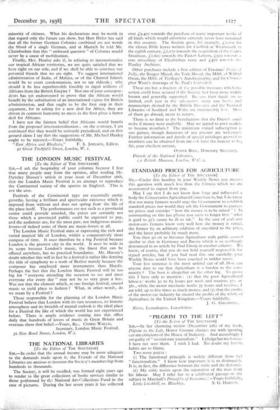A NEW DEAL FOR AFRICA
[To the Editor of THE SPECTATOR]
Elspeth Huxley is usually so accurate that I am surprised at some of the points in her letter in reply to My criticism of Mr. Michael Huxley's scheme for the inter- nationalisation of the British Eastern African Dependencies.
I certainly did not suggest that internationalisation would mean that `-` our trusteeship for the African is to give place to totalitarian tyranny." I wrote that German ambitions would not be assuaged by internationalisation, that the Reich demands full sovereignty over African territory, and that to grant that claim would bring totalitarian tyranny to Africa. The idea of internationalisation, Mrs. Huxley suggests, is to show that it is neither "morally inspiring nor practically wise to sit tight on one quarter of the earth's surface." That picture is misleading unless it also shows that the British Empire likewise holds one-fourth of the world's population.
Moreover, Great Britain—the only British governmental entity which would contribute directly to (though others would be affected by) this scheme for East African inter- nationalisation—is not, as propagandists so often suggest, the possessor of a quarter of the globe. Mrs. Huxley has not mentioned the vital fact that the Dominions are masters in their own houses, and that the responsibility of the public and Government of Great Britain is reduced to that of adminis- tering the Colonial Empire—and not even all of that, for Southern Rhodesia is self-governing and the Mandated Territories could not be transferred to other ownership merely by the unilateral act of a surrenderist British Government.
Then Mrs. Huxley recommends internationalisation because it would "satisfy our own conscience." I hope I shall not be deemed a jingo if I suggest that, despite human shortcomings in Colonial administration and development, the British con- science in respect of the Colonial Empire need not be unduly troubled vis-d-vis foreign Powers generally and Germany in particular ; those who know most about the Colonial Empire are the foremost advocates of a policy of accelerated develop- ment, but, thanks to the modern British conception of true Imperialism, they do not propose that such a development should be at the expense of the sacrifice of native interests— as would most certainly be the case if Germany were once more to administer African territory.
Then I am asked why we reject any scheme "which would enlist the enthusiasm, experience and wealth of other nations in the development of backward territories ? " Mrs. Huxley well knows that the enthusiasm, experience and finance of any non-Briton is allowed the same scope in East Africa as that of any non-official Briton. American citizens and American capital have been prominent in Northern Rhodesian cop?er mining, and American money is now active in gold mining in Tanganyika Territory ; a French-Belgian consortium was one of the first in the field when gold was discovered in the Kaka- mega area of Kenya ; Greeks, Swedes, Danes and others have played a big part in the progress of the sisal industry ; a French mission introduced coffee to Kenya ; or, to turn to quite another quarter, of the 131 missionaries who landed in Tangan- yika Territory during 1937, 55 were German, 20 Swiss, and only 15 British.
Though admitting that internationalisation would not satisfy Germany, Mrs. Huxley believes it would lessen European tension because we should be giving other nations a chance to share in the administration and development of Africa. As to development, they have completely free scope at present, as the previous paragraph suggests. Is it conceivable that the menace of the Axis over Europe would be made smaller in the eyes of Ruthenia, Poland, Hungary, Denmark, and the Ukraine —which appear to be the next States on the Nazi list—by the proposal that a few of their citizens might be taken in to the ad- ministrative or technical services of an internationalised East Africa ? As to Germans, perhaps Signor Mussolini might oblige his friend Herr Hitler by opening the administrative services of Italian East Africa to German entrants.
I did not suggest that Colonies could be well administered only by men of British birth, but I do say that we should be false to our trusteeship if, by the admixture of men of many races who have different moral and mental attitudes from our own, we were recklessly to risk the deterioration of the present British Colonial Service, which I believe to be the finest in the world. Mr. Huxley's plan provided that 5 per cent. of the recruits each year should be foreign nationals, so that at the end of a decade half the junior staff would be non-Britons. That, in my view, represents a risk which is quite unwarrantable.
"To maintain the status quo we shall probably have to fight for it," writes your correspondent. I should not accept that postulate. Herr Hitler may determine, or may already have determined, to risk war with the British Empire at some future date, but in such an event the claim for Colonies would be merely an excuse, not the reason, just as the murder of a German diplomat in Paris by a demented young Jew was the excuse, not the reason, for the imposition by Germany of a fine of £8o,000,000 on her Jewish population and for an officially organised outbreak of unparalleled persecution of a defenceless
minority of citizens. What his declarations may be worth in that regard only the future can show, but Herr Hitler has said that all the former German Colonies combined are not worth the blood of a single German, and at Munich he told Mr. Chamberlain that this "awkward question" of Colonies would never be a cause of mobilisation.
Finally, Mrs. Huxley asks if, in refusing to internationalise our tropical African territories, we are quite satisfied that we have right on our side, and if we shall be able to convince our potential friends that we are right. To suggest international administration of India, of Malaya, or of the Channel Islands would be to court condemnation, not to say ridicule ; why should it be less reprehensible forcibly to expel millions of Africans from the British Empire ? Not ohe of your correspon- dents has yet endeavoured to prove that the African would benefit by the substitution of an international regime for British administration, and that ought to be the first step in their argument, for in asking for a new deal for Africa, they are driven in common humanity to mean in the first place a better deal for Africans.
I have not the faintest belief that Africans would benefit from the proposed internationalisation ; on the centrary, I am convinced that they would be seriously prejudiced, and on that ground alone I say that the suggestions of Mr. Michael Huxley ought to be rejected.—Yours faithfully,



































 Previous page
Previous page